Pristine Rivers
Rationale
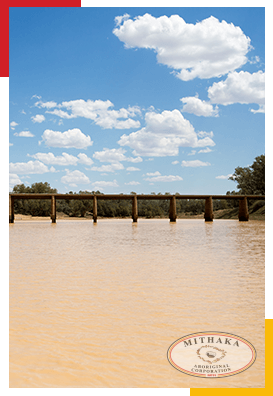
Mithaka People are Traditional Owners who in accordance with Mithaka customary laws and traditions have social, economic, cultural and spiritual affiliations with, and responsibilities for, Mithaka traditional land and waters.
Our People have lived and worked across these lands for generations and hold strong connections to the ancient and contemporary systems it supports. This includes Mithaka People's connections to the region’s communities, the Barcoo and Diamantina Shires, and tourism, pastoral and mining industries operating throughout the area, and to the extensive Cultural Heritage and Site of Significance across their Country
Mission
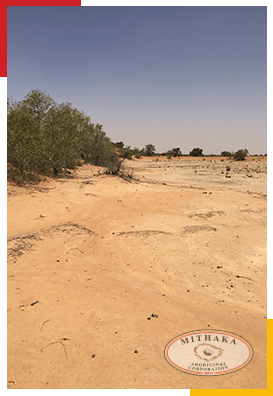
Vision
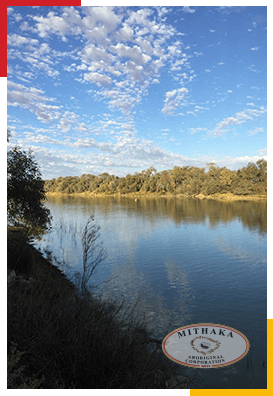
Care for Country, Care for Culture, Care for Our People
Trust / Respect / Actions / Results
Values
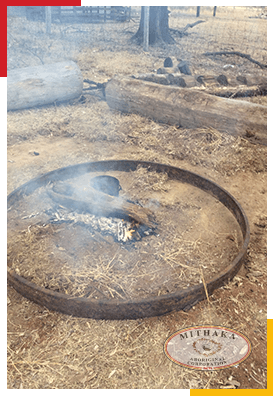
Mithaka Country is approximately 33,800km2 of pristine rivers, rolling gibber plains and sandhill’s located in the Channel Country of SW Queensland. Mithaka Country falls under two Shire Council areas Diamantina Shire Council and Barcoo Shire Council.
- Acknowledge, respect, and promote the rights and interests of Mithaka Traditional Owners.
- Establish trust to create a neutral platform for effective relationships.
- Protect and sustainably use bio-cultural heritage through a legally binding process.
- Implement best practice using culturally sensitive guidelines and principles.
- Promote innovative responses that traverses and benefits western and traditional knowledge; and
- Create opportunities to develop, promote and engage with Mithaka Traditional Owners.
Context
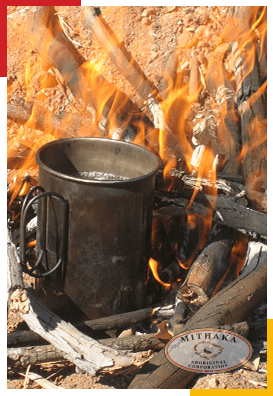
The Wild River Declarations were at that time strongly supported by Mithaka and other traditional owner groups under the Tibooburra Resolution.
The Tibooburra Resolution was a statement with 8 recommendations to government by members of Mithaka, Wangkangurra, Yarluyandi, Kulalli and Iningai Traditional Owner groups. This included a recommendation that called for Wild River Declarations for the Cooper, Diamantina and Georgina and a recommendation to exclude coal seam and shale gas projects, and other mining resource extraction on high preservation areas and special floodplains.
In 2013, and in our opinion with very little consultation with Traditional Owner groups the Newman Government revoked the Declarations and in 2014 repealed the Wild Rivers Act. It was replaced with weaker controls under the Regional Planning Interest Act which reduced the floodplain areas that were once protected and allowed unconventional gas mining on these high preservation and floodplain areas.
In the lead-up to the 2015 Queensland election, Labor committed to restoring strong protections to the Channel Country rivers, which was welcomed by Mithaka Traditional Owners and many in the community.
The election commitment from Labor was to “work with Traditional Owners, stakeholders, and communities to legislate protections for Queensland’s pristine rivers from large scale industrial operations.”
Beliefs

As well as underpinning social and economic well-being, Mithaka’s relationship with waters, lands and its resources is crucial to cultural liveliness and resilience.
The cultural significance of water to Mithaka is not understood by most politicians and remains unrecognised in the development and implementation of water law and policy.
Mithaka is dedicated to collegial management of their Country and Culture.
Reparation of our water systems is costlier than protection through effective interventional management. The precautionary principle must be followed when managing threats to our waterways.
Water in the Channel Country is at the core of sustainable development, is finite and an irreplaceable resource that is fundamental to humanwell-being.
Fostering the opportunities for cooperation in water management among all stakeholders and improving the understanding of the challenges and benefits of water management partnerships can help build mutual respect, understanding and trust among partners.
Activating political will and commitments (especially election promises) to address water issues remains crucial, and must be continual, intentionally inviting, engaging and funded.
Scarcity and poor management of our water resources poses serious and growing threats to communities, industries, culture and the environment. Human health and welfare, food security, economic development, employment opportunities and ecosystems are all at risk, unless water and land resources are managed more effectively into the future.
Australian-based independent research about the impact of unconventional gas mining (shale, coal seam and tight gas) is needed.
Coordinated actions on the development of initiatives that will improve land and water management practices will serve to improve the health and sustainability of our rivers and adjacentwatersheds;
Longer-term access to healthy water is fundamentally linked to the region’s economy and quality of life.
Every state and territory has its own complex water management regime. Most include specific legislative provisions covering their rights and property in water.
Position
Mithaka take the following position on the Pristine Rivers Policy for the Cooper Creek, Georgina and Diamantina River systems:
Protection & Maintenance
- We must all share responsibility and leadership for protecting the varied environments surrounding rivers and their associated floodplains, and the Country between the river systems.
- The global importance of cultural, ecological and scientific aspects of the three Channel Country rivers must be protected.
- Aboriginal representatives from south-western Queensland must be appointed to care for country in Pristine Rivers regions.
- Aboriginal heritage and cultural landscapes of the three river areas and associated floodplainsmust be maintained by supporting management in accordance with the Aboriginal traditions and customs for the areas.
Legislation
- Restore protection to three Channel Country rivers systems and floodplains by returning to a legislative framework similar to the Wild Rivers legislation.
- Queensland, Northern Territory, New South Wales and South Australian Governments must work together in a coordinated way to establish effective and complementary legislation to protect the cultural, ecological and scientific values of the Lake Eyre Basin across jurisdictions.
Management
- Any management committee making decisions affecting the Pristine Rivers must have Aboriginal representation, elected by the Traditional Owner groups.
- Support and resource Aboriginal organisations to engage in consultation and work with the government on Pristine River policy development and the management of the three water systems
- A Lake Eyre Basin Native Title advisory group needs to be formed and funded to provide advice to Qld, NSW, SA and NT governments.
- Support the Native Title Groups to review and update the 2011 “Tibooburra Resolution”. This will help guide policy development and implementation moving beyond 2018.
- Support the Native Title Groups to review and update the 2011 “Tibooburra Resolution”. This will help guide policy development and implementation moving beyond 2018.
- The management of sites of significance located along rivers and floodplains, and stories associated with the water and natural resources located in these areas is vital for the maintenance of culture for Aboriginal people of the Channel Country.
- Management of Country by government, mining and pastoral industries should be interlocked with all other partners, including Mithaka and our Aboriginal neighbours.
- Continue to allow sustainable pastoral activity in the Pristine River areas by committing Land Protection Officers to monitor and restrict overstocking.
- Appoint 4 (2 Qld and 2 SA based) Cultural Heritage and Environmental Rangers to manage the welfare of the environment and sites of significance.
Unconventional Gas Mining (shale, coal seam and tight gas)
- Exclude all mining resource activities and petroleum and gas resource activities (including coal seam gas, shale gas, and tight gas) from the areas that were recognised as High Preservation Areas and Floodplain Management areas under the Wild Rivers legislation.
- Exclude unconventional gas mining projects elsewhere until sufficient and proven knowledge, understanding and mitigation provides the assurances the whole community needs to fully protect the region, its water resources and communities.
- State and Federal governments, and various industries must invest in extensive Australian research on the cumulative impacts of unconventional gas mining on rivers, groundwater, floodplains, land and communities.
Irrigation
- Considering the fragility of the Lake Eyre Basin and the Great Artesian Basin’s, there should be a very careful and thorough processes in place before considering further irrigation development in the three Channel Country River catchments. More research needs to be done on the environmental effects of irrigation on the Lake Eyre Basin and wider Great Artesian Basin, before any new licenses are approved.
Temporary measures
- Mithaka supports amendments to the Regional Planning Interests Regulation 2014 to improve protections to the Channel Country rivers and floodplains as an interim step, in particular any amendment that would include new 'resource activities' in the “unacceptable uses” of floodplains.
- While we acknowledge this would not fully restore equivalent protection afforded by the Wild River Declarations this would secure interim protections from unconventional gas mining.
